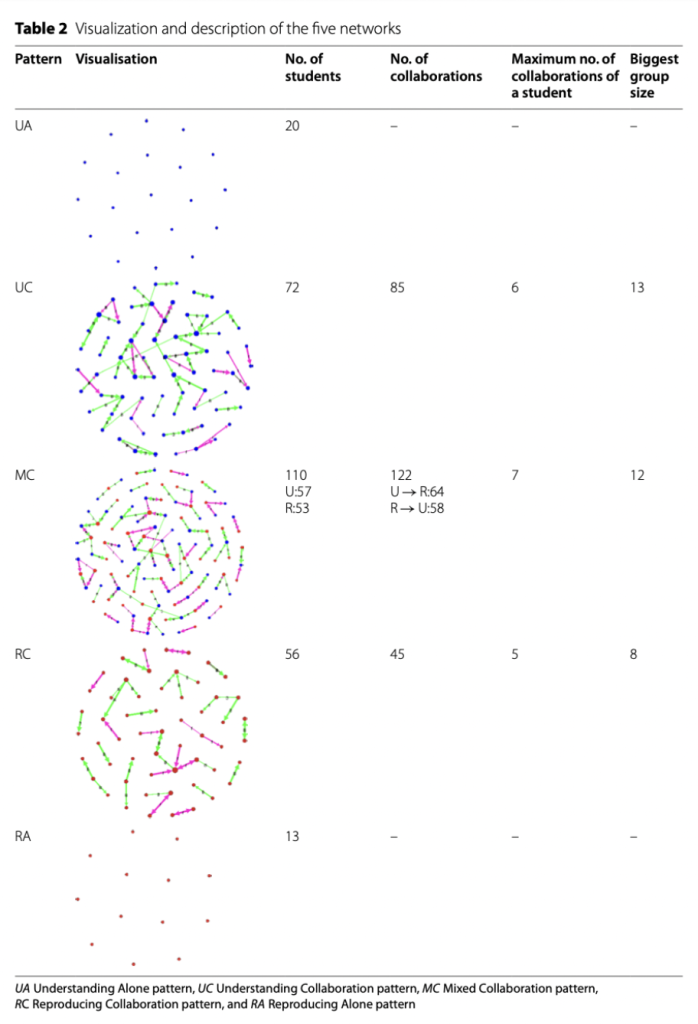By Conchúr Mac Lochlainn
The word ‘collaboration’ is everywhere, and on everyone’s mind, as digital educators have grappled with new modalities of learning, during the COVID-19 pivot. Concerns over isolation, and its effects on wellbeing (Filho et al., 2021), have been well-documented, and the importance of collaborative learning as a means of alleviating this isolation has also been explored (Stoytcheva, 2021).
At the same time, collaboration is like rowing a boat; if working in tandem, can lead to splendid results, but if rife with miscommunication, can sink the ship! In this informative mixed method study, Feifei Han and Robert Ellis explore collaboration in a rather granular manner, by exploring not simply the intensity of collaboration, but what types of patterns can be interpreted, through surveying a sample (n=193) of students at an Australian university. An innovative aspect of the study is its utilisation of cluster analysis techniques. In doing so, the authors describe two broad clusters, learners with a disposition towards understanding (n=103) and towards reproducing (n=90). These two clusters differed, with students in the understanding cluster using a deeper approach to learning, and obtaining higher scores across a range of measures.
What makes the study innovative, however, is that respondents were further broken down into categories reflecting whether the students worked alone, or in collaboration, leading to five broad networks of participants:

Findings from this analysis demonstrated that almost 20% of students chose to work alone. The authors conclude with a rich discussion on the implications of these findings, including suggestions that more ‘understanding’-oriented students should be encouraged to collaborate, including with students of differing orientations:
“To prevent students from not participating in collaborative learning, the teaching staff of the course may consider redesigning the learning and assessment tasks, which should include some mandatory collaborative activities, such as team presentations and group portfolio, which will not only signal to students the importance of collaboration in the course but also create opportunities for them to practise the skills (Barkley et al., 2014).”
A more blunt way to describe the above is a process of forced collaboration, and this raises an interesting question regarding collaborative patterns in online learning more broadly – namely, is a preference or disposition for solitary learning online problematic or does it reflect an individual preference worthy of respect and facilitation? Much has been written of the dangers and privileges of learning design premised on catering to “roaming autodidacts” (McMillan Cottom, 2016), those reified for their particular qualities and traits (being generally self-driven and regulating, as well as educated, wealthy and Western).
At the same time, given that many participants voluntarily chose to work alone, and debates regarding personalisation in online learning (Farrell, 2022), researchers should consider when and why collaborative approaches are particularly useful for these cohorts, as well as why many learners may have an active preference for working alone. There is some evidence that persons with such preferences face social opprobrium with quite real consequences (Ren and Evans, 2020) and it is therefore worth exploring what lessons wider literatures can give on how to promote voluntary forms of peer collaboration, respectful of, and responsive to, these preferences. For example, Stavros, Mavridis and Demetriadis (2021) report on an interesting exploratory example of a peer student communicative network of MOOC learners with promising findings, and practitioner guides such as Farrell et al (2021) emphasise the importance of collaboration across a multiplicity of perspectives and modes.
There may well be an interesting and timely study in exploring whether these principles, and others, can shift learners who have a preference for studying alone to forms of dialogue, to fulfill what Leary and Baumeister (1995) term “a fundamental human motivation”, namely, the need to belong. A more provocative question might be whether, even if possible, such interventions are universally desirable, or whether there can be, in some circumstances, a right to work alone?
References
Farrell, F. (2022). The complex and contested role of personalisation in online learning. British Educational Research Association (BERA).
https://www.bera.ac.uk/blog/the-complex-and-contested-role-of-personalisation-in-online-learning
Farrell, O., Brunton, J., Ní Shé, C., and Costello, E. (2021). #OPENTEACH: Professional Development for Open Online Educators. Pressbooks OER.
https://oer.pressbooks.pub/openteach/
Filho, W., Wall, T., Rayman-Bacchus, L., Mifsud, M., Pritchard, D., Lovren, V., Farinha, C., Petrovic, D., and Balogun, A. (2021). Impacts of COVID-19 and social isolation on academic staff and students at universities: a cross-sectional study. BMC Public Health, 21.
https://doi.org/10.1186/s12889-021-11040-z
Leary, M., and Baumeister, R. (1995). The need to belong: Desire for interpersonal attachments as a Fundamental Human Motivation, Psychological Bulletin, 117(3), 497-529.
https://doi.org/10.1037/0033-2909.117.3.497
McMillan Cottom, T. (2016). Black Cyberfeminism: Intersectionality, Institutions and Digital Sociology, in Daniels, J., Gregory, K., and Mc Millan Cottom, T., Digital Sociologies. Policy Press.
https://papers.ssrn.com/sol3/papers.cfm?abstract_id=2747621
Ren, D., and Evans, A. (2020). Leaving the Loners Alone: Dispositional Preference for Solitude Evokes Ostracism, Personality and Social Psychology Bulletin, 47(8), 1294-1308.
https://doi.org/10.1177/0146167220968612
Stoytcheva, M. (2021). Developing a sense of belonging in a collaborative distance learning course: Breaking isolation in online learning, AIP Conference Proceedings, 2331(1).
https://doi.org/10.1063/5.0043330
Tegos, S., Mavridis, A., and Demetriadis, S. (2021). Agent-Supported Peer Collaboration in MOOCs, Frontiers in Artificial Intelligence.

